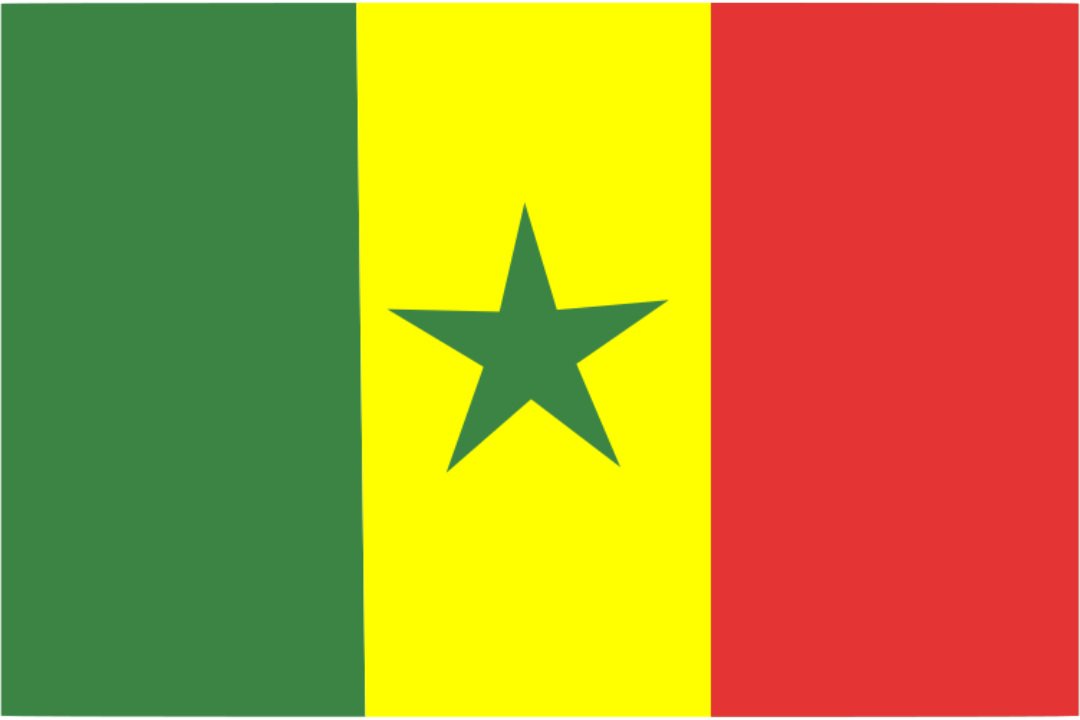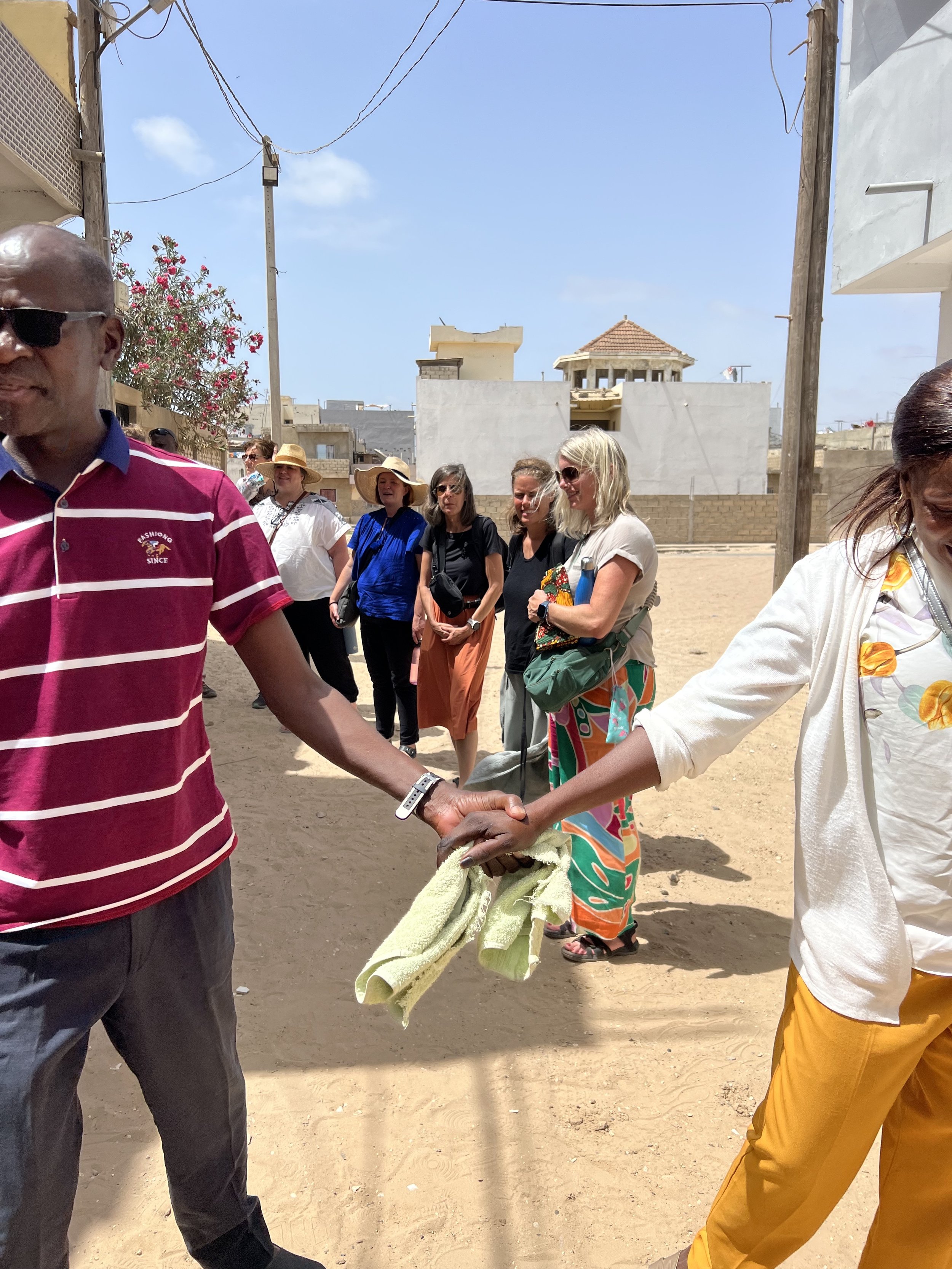Greetings and Gestures in Senegal
Greeting gives Senegalese people a sense of life. It makes us feel good, and above all, it makes everyone feel loved, respected, and recognized as a human being.
by Katy Wheelock, Vive l’expérience Owner and High School Teacher in Virginia with Matou Diallo, French Teacher in Maryland, Senegal Country Director for Vive l’expérience
Senegal is Closer Than You Think!
Did you know you can hop on a direct flight to Senegal from JFK to Dakar, and you’ll be there in about 8 hours? It’s only a 4-hour time difference to the USA East Coast for half of the year. When you change your clocks to daylight savings time, it will still only be a 5-hour time difference. French is the official language of Senegal and you are likely to be able to speak French with everyone you meet in cities and schools. One of the best ways to connect with people while you visit Senegal is through greetings.
©2023 Vive l'expérience
Making Connections
Taking the time to greet new acquaintances is very important in Senegal, whether an educator you meet in a school, a vendor in a market, or the hotel manager. This simple and affirming practice is a crucial cultural component to any conversation. In the United States, we often want to be respectful of other people’s time, so we just jump to the question or dive into conversations without lengthy greetings. In Senegal, the country known for teranga, or hospitality, newcomers should slow down, and take the time for the lengthy greeting which will help you connect with the Senegalese you meet.
Vive l’Expérience!
When I studied and lived in Senegal for two years, I was fortunate to participate in a cross-cultural training which explained many cultural perspectives that helped me interact effectively and appropriately. I also benefited from an excellent immersion training in Wolof; my teacher was Rudy Gomis of Orchestra Baobab, but that’s a story for another day!
“In Senegal, Greetings may be done in a variety of manners: shaking hands, bowing, and curtsying. It’s imperative that the youngest initiate greetings to their elders.”
Several decades later, I am still sharing these skills with my high school students. And with my organization, Vive l’expérience, we organize French immersion trips to Senegal for educators of the French language. Our groups of 16-18 teachers have the opportunity to tour local private and public high schools in rural and urban settings as well as universities, observe classes, chat with students, discuss educational projects and challenges with the teachers and professors. We participate in hands-on workshops such as learning to batik, or trying our hand at drumming with djembés. Senegalese friends and family spend time with us whether eating a homemade thieboudienne around the bowl, or visiting historical Gorée Island. Our participants explore the local artisanal markets and try their skills at bargaining for their purchases. In every situation, greetings set the tone for the interaction and establishing a positive relationship.
Photo: © 2023 Vive l’expérience
An Insider Perspective
Our Vive Senegal Country Director, Matou Diallo,has done a lot of cross-cultural training in the past with his work with Peace Corps Volunteer Trainees in Thiès, the second largest city of Senegal, and various U.S. university study abroad programs in Dakar, the capital. As a language teacher of French and Wolof, he does a great job preparing people for visiting or living in Senegal. Here’s what he has to say about greetings.
Gestures
“In Senegal, people in general shake hands to greet each other. Greetings may be done in a variety of manners: shaking hands, bowing, and curtsying. In general, Senegalese people wait to be asked their name; they do not spontaneously give it when greeting a stranger. Greetings are a good way to socialize in Senegal.
Start Your Day with Greetings!
When you wake up in the morning, after a good night's sleep, it's really important to say hello to the people around you. It's imperative that the youngest initiate greetings to their elders. In general, we prefer to ask about the conditions in which people find themselves in the morning. So, we ask if the person slept well by asking “Mbaa nelaw nga bu baax”? Which means “Did you sleep well”, in the sense of “I hope you slept well”. The term mbaa implies that the person has slept well, so we hope to get a positive answer. So every greeting has its own meaning. As a 95% Muslim country, we prefer to use the phrase “Asalaam alekum”, which means peace be upon you. So anyone greeted with this expression must imperatively reply with “Wu alekum salaam” which means peace be with you too; but in Senegal we say “Maalekum Salaam”. This is because Wolof has trouble pronouncing two intersecting vowels.
Typical Greetings in Wolof
Greetings are not only limited to this Arabic expression Asalaam alekum, but it's also important to stop and ask about the health of the person, their family, their children, if any, their parents, their spouse and so on. A greeting conversation can go like this:
Faatu: Salaamaalekum ! (Peace be upon you!)
John: Maalekum salaam ! (Peace be with you too.)
Faatu: Naka nga def ? (How are you?)
John: Maangi fi rekk. (I am here only. [I am doing well])
Faatu: Naka nga fanaane ? (How did you spend the night?)
John: Jámm rekk, alxamdulilaay. (Peace only)
Faatu: Sa yaram jámm ? (Are you in good health?)
John: Jámm rekk, alxamdulilaay. (Peace only.)
Faatu: Ana -or- naka waa kër gi ? (How is the family?)
John: Ñungi fi. (They are here. [They are doing well])
Faatu: Naka xale yi? (How are the kids doing?)
John: Ñungi fa. (They are there. [They are doing well])
Social Cohesion and A Lasting Peace
Greetings are everywhere and at all times. Greetings are an integral part of Senegalese life. When you see someone for the first time, you have to greet them properly. Greetings give Senegal a social cohesion and a lasting peace. Without greetings, nothing works in Senegal. When you go into a store to buy a product, for example, if you have the misfortune not to say hello to the person, you risk not being talked to. Greeting gives Senegalese people a sense of life. It makes us feel good, and above all, it makes everyone feel loved, respected, and recognized as a human being.”
-Contributed by Matou Diallo
Photo: © 2023 Vive l’expérience
Holding Hands - Holding Hearts
Don’t be surprised if someone holds your hand for 2-3 minutes beyond a brief handshake while they greet you. This is typical in Senegal, but can be a little awkward and unexpected for people from other cultures. Try not to pull back your hand as it’s a sign of friendship and connection. Sometimes women may encounter a man who will not touch a woman outside their family for religious reasons. If this happens, they will put their hand over their heart as a greeting to you, and you can do the same.
Wolof and French
It’s important to recognize that knowing a little bit of Wolof can go a long way as your effort will be noticed and appreciated. Vive always prepares our travelers with some Wolof in our pre-departure meetings, but if you have the chance to travel to Senegal and don’t know any Wolof, that’s ok. Be sure to greet with a “Bonjour” and follow up with the questions Matou explained above about health, sleep, and family. Be patient and don’t rush the conversation. Before you know it, you may have made a new friend. They may even give you a Senegalese name, often a name of someone dear to them in their family, and they may share their family name with you. This is a very special moment and not uncommon.
Learn More!
On our website, we welcome you to enjoy free resources via the “Resources” tab, with lessons and hundreds of videos, curated by topic about Senegal, including a few about Senegalese greetings. The “About - Blog” tab can also take you to our newsletters if you’d like to read more about Senegal. If you have any questions about Senegalese greetings, or travel to Senegal, reach out to us at www.vivelexperience.com. Merci et jërëjëf!
Guest bloggers Katy Wheelock and Matou Diallo. ©2023 Vive l'expérience
Katy Wheelock, the founder of Vive l’expérience, brings over 30 years of experience as a trip organizer and leader, having designed and led numerous student exchanges and educational trips to Senegal, Quebec, and France as a middle and high school teacher. She lived in Senegal for two years in the late 1990s as a Rotary Ambassadorial Scholar at the Université Cheikh Anta Diop, where she studied African Literature and Civilizations. Her work today draws on her diverse experiences across francophone countries, including refugee assistance for the International Organization for Migration, peacekeeper training with the African Union, and volunteering with language programs and a homeless children’s shelter in Senegal. Katy’s extensive network and first-hand cultural knowledge provide a solid foundation for the unique and transformative experiences she curates for Vive's participants, combining her passion for travel, education, and meaningful cultural immersion.
Matou Diallo, Vive's Senegal Country Director, is a Senegalese French teacher based in the USA and leads Vive's 4-week Global Service-Learning student projects in Senegal, and when possible, their teacher trips. With extensive experience teaching French and Wolof, Matou brings a deep understanding of cross-cultural dynamics and decades of leadership in guiding volunteers and students in Senegal. His family hosted Peace Corps volunteers during his youth, inspiring his passion for cultural exchange.
Matou later became a language trainer, working with the U.S.-based study abroad programs such as SIT and CIEE, where he honed his expertise in cross-cultural and linguistic training. His leadership roles in various study abroad programs have solidified his reputation as an expert in this field. Matou's unique background and skills make him an invaluable asset, ensuring rich and meaningful experiences for all participants.





